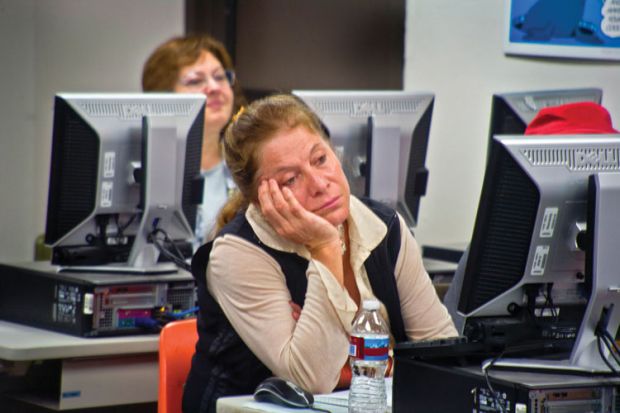Source: Alamy
Age concern: adult learners can be ill at ease in classes full of younger students
The University of Sheffield has been accused of turning its back on the city that founded it over controversial plans to cut adult education courses.
Sheffield has confirmed that it is to make major changes to the Institute for Lifelong Learning (TILL) after the number of part-time students fell from 1,300 in 2009 to about 350 this year.
From 2015-16, many part-time degree programmes will be delivered by individual faculties rather than by TILL staff, and many evening classes will be lost. New foundation degree programmes will also be created in a bid to boost student numbers, Sheffield has said. Unlike much of TILL’s existing provision, these will be taught in the daytime rather than the evening.
But TILL students are campaigning against the changes, claiming they will make it harder for Sheffield people to access higher education.
“By farming courses out to the faculties, it dilutes their effectiveness,” said David Drew, one of the student representatives fighting the moves. “You’ll have one or two older part-time students at the back of a room of young people, which is not what people want…You sometimes think it might be a strategy to kill off part-time courses.”
He said plans to scale back evening classes would hinder local people’s access to the university, which was founded in part thanks to the penny donations of Sheffield factory workers (worth £15 million in today’s money) just over a century ago. “It feels like the university is turning its back on the city,” Mr Drew said.
However, the university insists that it firmly supports the institute, which is to be renamed the Department for Lifelong Learning to “project a more friendly and accessible image” to potential learners, according to minutes from the university’s governing council. The minutes add that “decisive action” was needed, or part-time provision would “gradually decline to nothing”.
Deputy vice-chancellor Paul White said Sheffield is “actively pursuing a significant increase to the breadth of our offer of part-time undergraduate programmes”, while university access would be improved by the introduction of 17 new foundation year courses.
“These will build confidence and skills for mature students who do not have traditional entry qualifications,” Professor White said.
“Alongside 13 new part-time degree programmes based in our faculties, the Department for Lifelong Learning will offer 14 new Certificates in Higher Education run in partnership with specialist departments”, which would include some evening teaching, he added.
Register to continue
Why register?
- Registration is free and only takes a moment
- Once registered, you can read 3 articles a month
- Sign up for our newsletter
Subscribe
Or subscribe for unlimited access to:
- Unlimited access to news, views, insights & reviews
- Digital editions
- Digital access to THE’s university and college rankings analysis
Already registered or a current subscriber? Login





